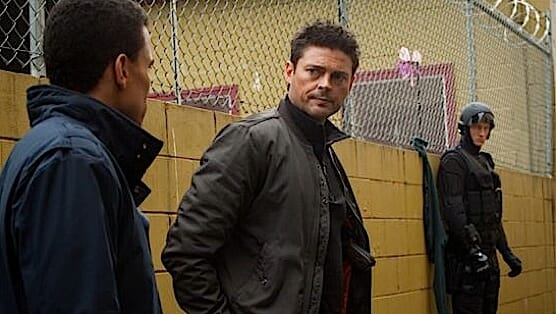Almost Human: “Straw Man” (Episode 1.13)

Last week, I began recapping NBC’s Hannibal, which, for my money, stands as the finest drama currently on network TV. There was a fear on my part, however, that viewing such a masterclass in filmmaking and writing each week would unfairly bias me against the other shows that I recap. After all, once you’ve been given a beautiful, delectable gourmet meal, whatever you eat directly afterwards, no matter how delicious, will inevitably pale in comparison.
Luckily, Almost Human really stepped up its game this week. And as it should, considering that this marks the end of the show’s initial 13-episode-order and its official first season finale. Pressure is on to finish strong, and “Straw Man” does just that, highlighting all the elements that make the show enjoyable—from its inventive, sci-fi crime cases to its emotional heart-to-hearts between the two leads to the bits of levity slipped in between the cracks. (Dorian singing Lionel Richie definitely signals a series highlight.)
The episode begins with Kennex and Dorian investigating the case of a young, destitute girl who appears to have undergone a brutal (and unorthodox) killing. Not only has her body been sliced open and the organs removed, but also the cadaver has been filled with straw. This marks the MO of a notorious serial murderer called The Straw Man, a killer that Kennex’s late police father helped put away years ago. Believing the perpetrator to be a copycat, Kennex and Dorian head over to the prison to interrogate Michael Costa, the paranoid schizophrenic who Kennex senior pinned the crime on. Here, not only does Costa proclaim his innocence—he experienced several “black outs” that prevented him from giving a solid alibi—but he also claims that Kennex’s father believed his story and was in the process of trying to prove the man’s innocence when he was killed.
The show certainly wastes no time in affirming the validity of Costa’s claim. Indeed, the true Straw Man turns out to be a seemingly innocuous, wheelchair-bound man named Glenn. Using the wheelchair as a front (he doesn’t really need one), Glenn takes advantage of desperate vagabonds looking for a warm place to stay. He offers them a place to sleep and, once they are alone, proceeds to disable and abduct them. It turns out, far from directly murdering people, Glenn uses a 3AD printer-like technology to make an exact copy of the bodies, which he fills with straw. That way, police will believe that all of the abductees have been killed and, thus, will stop looking for them. Meanwhile, Glenn tests various kinds of robotics on his victims, hoping that it will eventually lead to a way to cure the degenerative disease that’s slowly killing his body.
-

-

-

-

-

-

-

-

-

-

-

-

-

-

-

-

-

-

-

-

-

-

-

-

-

-

-

-

-

-

-

-

-

-

-

-

-

-

-

-








































